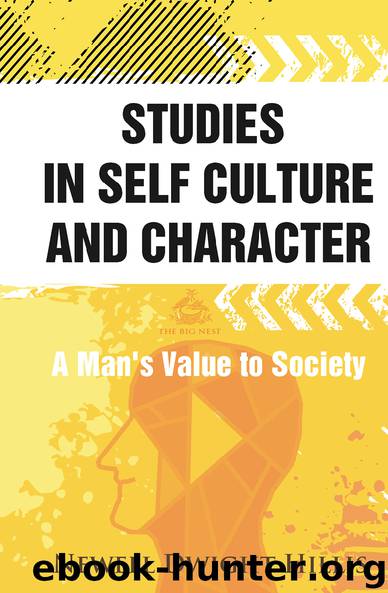Studies in Self Culture and Character by Newell Dwight Hilli

Author:Newell Dwight Hilli
Language: eng
Format: epub
Tags: character, worth, ideals, mind, morality, imagination, friendship, vision, living, philosophy, psychology
Publisher: The Big Nest
Published: 2015-04-22T00:00:00+00:00
IX. Conscience and Character
Von Humboldt said that every man, however good, has a yet better man within him. When the outer man is unfaithful to his deeper convictions, the hidden man whispers a protest. The name of this whisper in the soul is conscience. And never had monarch aspect so magisterial as when conscience terrified King Herod into confession. The cruel, crafty despot had slain John the Baptist to gratify the revenge of the beautiful Jezebel, his wife, reproved of John for her outrageous sins. But soon passed from memory that hateful night when the blood of a good man mingled with the red wine of the feast. Luxury by day and revelry by night caused the hateful incident to be forgotten. Soon a full year had passed over the palace with its silken seclusion. One day, when the dead prophet had long been forgotten, a courtier at the king’s table told the story of a strange carpenter, whose name and fame were ringing through the land.
Who is He? asked the feasters, pausing over their spiced wine. Who is He? asked the women, gossiping over the new sensation. Suddenly, conscience touched an old memory in Herod’s heart. In terror the despot rose from the banquet. As in the legend, when the murderer’s finger touched the gaping wound the blood began again to flow—a silent witness against the unsuspected but guilty friend, so Herod’s conscience opened up again his guilty secret. Memory, thrusting a hooked pole into “the ocean of oblivion, brought up the pale and drowned deed.” The long-forgotten sin was revealed in all its ghastly atrocity. It availed nothing that Herod was a Sadducee—the agnostic of antiquity. For, when conscience spake, all his doubts fell away. Immortality and responsibility were clear as noonday. Holding a thousand swords in her hand, conscience attacked the guilty king. Then were fulfilled Plato’s words: “If we could examine the heart of a king, we would find it full of scars and black wounds.” For no slave was ever marked by his master’s scourge as Herod’s heart was lashed by his conscience.
Socrates told his disciples that the facts of conscience must be reckoned with as certainly as the facts of fire or wood or water. None may deny the condemnation that weighed upon the soul of Herod or Judas, or the approval of conscience that transfigured the face of the martyred Stephen or Savonarola. For all happiness comes only through peace with one’s self, one’s record, and one’s God. All the great, from Æschylus and Sophocles to Channing and Webster, have emphasized man’s conscience as the oracle divine. Let the witnesses speak. Here is the Judge, famous in English history: It became his duty to sentence a servant for murdering his master. Suddenly, before the astounded onlookers, the Judge arose and took his place in the dock beside the prisoner. He stated that, thirty years before, in a distant province, he had taken the life and property of his master, and thereby gained his present position and influence.
Download
This site does not store any files on its server. We only index and link to content provided by other sites. Please contact the content providers to delete copyright contents if any and email us, we'll remove relevant links or contents immediately.
Rewire Your Anxious Brain by Catherine M. Pittman(18654)
Talking to Strangers by Malcolm Gladwell(13370)
The Art of Thinking Clearly by Rolf Dobelli(10489)
Mindhunter: Inside the FBI's Elite Serial Crime Unit by John E. Douglas & Mark Olshaker(9343)
Becoming Supernatural by Dr. Joe Dispenza(8217)
Change Your Questions, Change Your Life by Marilee Adams(7783)
Nudge - Improving Decisions about Health, Wealth, and Happiness by Thaler Sunstein(7707)
The Road Less Traveled by M. Scott Peck(7603)
The Lost Art of Listening by Michael P. Nichols(7506)
Mastermind: How to Think Like Sherlock Holmes by Maria Konnikova(7347)
Enlightenment Now: The Case for Reason, Science, Humanism, and Progress by Steven Pinker(7313)
Win Bigly by Scott Adams(7199)
The Way of Zen by Alan W. Watts(6614)
Daring Greatly by Brene Brown(6514)
Big Magic: Creative Living Beyond Fear by Elizabeth Gilbert(5773)
Grit by Angela Duckworth(5615)
Ego Is the Enemy by Ryan Holiday(5450)
Men In Love by Nancy Friday(5240)
The Laws of Human Nature by Robert Greene(5208)
